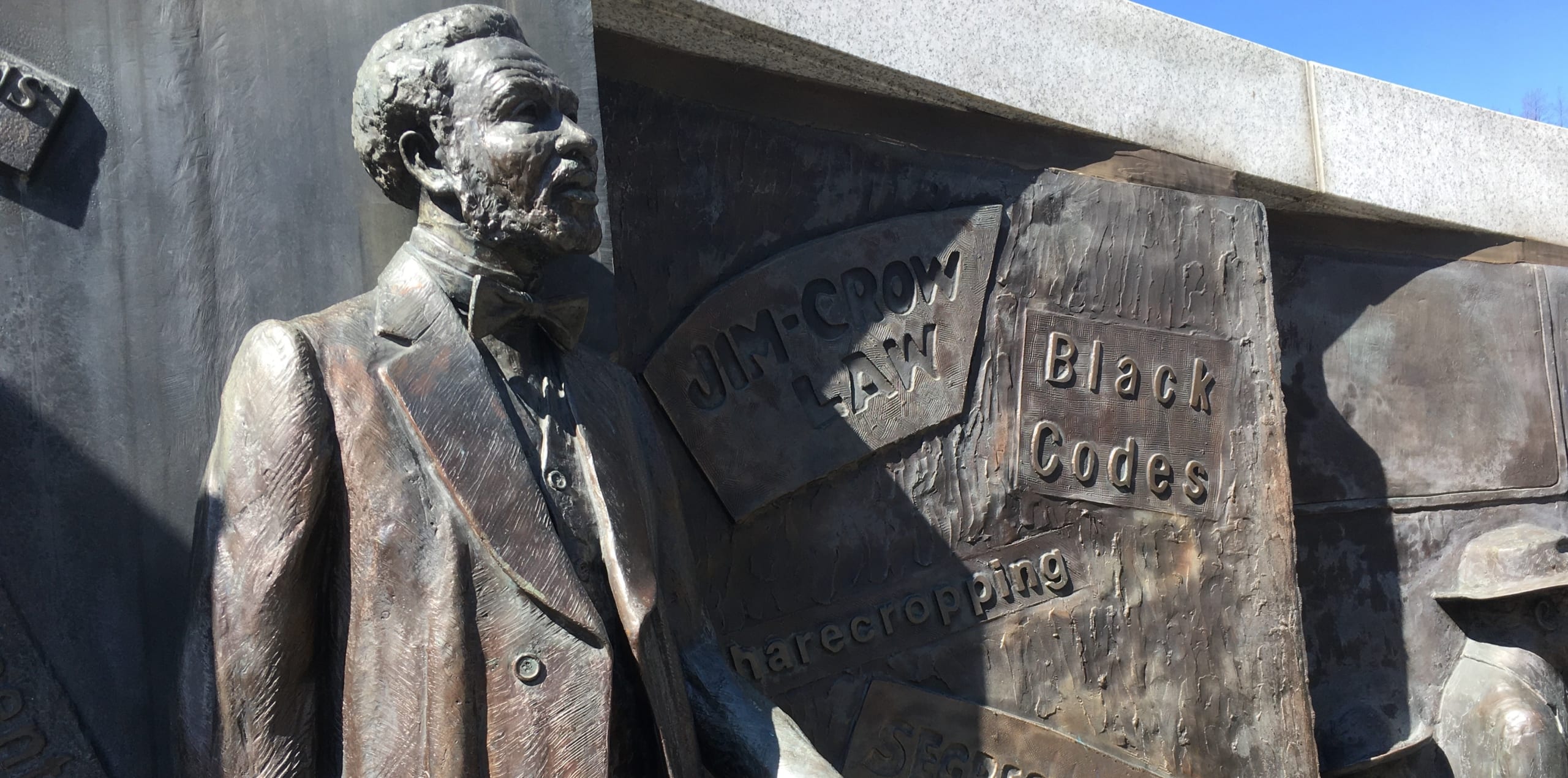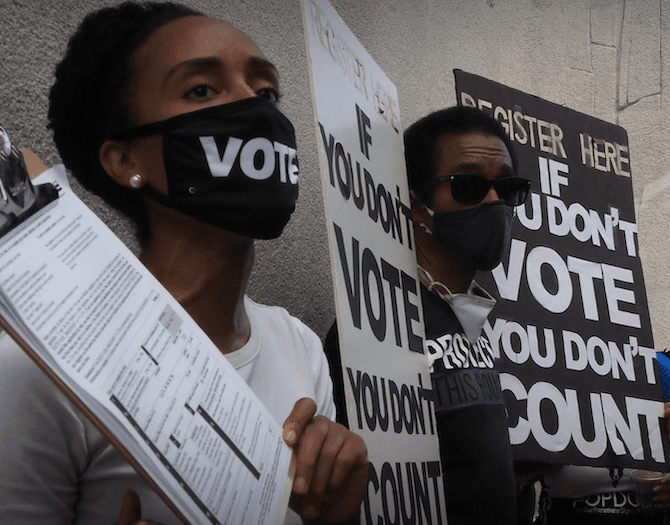Supreme Court Makes It Clear It Won’t Stop Partisan Gerrymanders

(Photo / Steven Rosenfeld)
For the second time in two weeks, the U.S. Supreme Court’s conservative majority has rejected gerrymandering rulings by lower federal courts that found extremism—based on intentional race-based discrimination or overt partisan prejudice — had undemocratically tilted the electoral playing field by diluting the vote of their opposition’s base.
On Monday, the Court issued two rulings, the first from Texas and second from North Carolina. These two states have been at the center of some of the most high stakes voting rights battles for this decade. In Texas, the Court let stand gerrymandered political maps where the state’s Republicans intentionally diluted the ability of non-whites to obtain a popular vote majority, even though race-based gerrymanders have long been declared unconstitutional. In North Carolina, where the Court last year ruled had illegally used race to gerrymander legislative districts — before a conservative ninth justice, Neil Gorsuch, was seated — it also did not rule on the merits of segregating voters.
Both cases were sent back to lower courts, where the Court’s conservative majority said the suits should be reevaluated based on last week’s high court rulings — which rejected Wisconsin voters’ rights to sue, saying they, unlike political parties, lacked standing. Last week, it also took no action on a Maryland gerrymander, the only gerrymandering case where Democrats abused their majority power, in this case, erasing a GOP U.S. House seat.
“The Court today goes out of its way to permit the State of Texas to use maps that the three-judge District Court unanimously found were adopted for the purpose of preserving the racial discrimination that tainted its previous maps,” wrote Justice Sonia Sotomayor, in a dissent signed by the Court’s three other liberal justices. “This disregard of both precedent and fact comes at serious costs to our democracy.”
Sotomayor plainly laid out the stakes — that the Court was sanctioning one of the ugliest and most enduring aspects of the American political system, where partisans in governing classes intentionally segregate voters to dilute popular vote majorities that likely could end their grip on state and federal power.
“It means that, after years of litigation and undeniable proof of intentional discrimination, minority voters in Texas—despite constituting a majority of the population within the State — will continue to be underrepresented in the political process,” her dissent continued. “Those voters must return to the polls in 2018 and 2020 with the knowledge that their ability to exercise meaningfully their right to vote has been burdened by the manipulation of district lines specifically designed to target their communities and minimize their political will. The fundamental right to vote is too precious to be disregarded in this manner.”
Needless to say, the civil rights groups that filed the lawsuits on behalf of the targeted non-white population, tried to put their best face on the rulings, suggesting that the door wasn’t fully closed to future Supreme Court action to rein in extreme gerrymanders.
“While it’s unfortunate that the U.S. Supreme Court decided not to hear this case right away, we are optimistic that the lower court will recognize, like they did in January, that North Carolina’s partisan gerrymandering is so egregious that it is unconstitutional and that our clients are the appropriate parties to be raising such claims,” said Allison Riggs, senior voting rights attorney for the Southern Coalition for Social Justice. “The harm done to voters when they are packed and cracked into districts that discriminate against them based on their political affiliations is clear and we will continue to pursue justice for our clients and all voters who deserve fair election districts. We hope to get this case back before the U.S. Supreme Court next term, in time for fair districts for 2020.”
“Americans overwhelmingly support the Supreme Court stepping in to end partisan gerrymandering, and that door is still open,” said Paul Smith, vice president of litigation and strategy at Campaign Legal Center, who argued the Wisconsin case before the Court. “The justices have returned the partisan gerrymander challenges from North Carolina, Wisconsin and Maryland to the lower courts with a clear roadmap of what it expects to see presented, and we plan to follow their guidance.”
The big picture here is anything but optimistic for those Americans who want to believe that their elected government is a representative democracy, and that one of the judiciary’s key functions is to serve as a check-and-balance against the other two constitutionally created arms, the legislative and executive branches.
Anyone who has followed the recent redistricting litigation has seen elaborate analyses where — in all cases but one, Maryland — the Republicans aggressively drew uncompetitive maps leading to the red supermajority legislatures and congressional districts that have dominated the nation’s political swing to the right this past decade. These GOP-monopolized jurisdictions have been behind the litigation and legislation to oppose Obamacare, LGBTQ civil rights protections, abortion and reproductive rights, climate change-recognizing regulations — all issues that nationally have majority support.
The decision by the Supreme Court’s conservative majority to not act on the factual record presented in these cases sends a clear signal to GOP partisans that voter suppression tactics are an acceptable way of conducting their political business.
Barely two weeks ago, in North Carolina, for example, the state’s GOP legislature said it would pursue new measures to restrict early voting on the weekend before the fall general election — when roughly 200,000 people voted in 2016, many of them black churchgoers. While the high Court puts gerrymandering litigation on a slow track, right-wing partisans are hitting the gas with their latest suppressive gambits.
Sotomayor’s dissent explained in district-by-district detail why the Court’s conservatives failed in not recognizing the overlapping racial and partisan considerations of the Texas Republicans who drew political maps. The Court’s majority was playing a deceptive and damaging game, she said, one that is encouraging darker forces to triumph and endure.
“The Equal Protection Clause of the Fourteenth Amendment and Section 2 of the Voting Rights Act secure for all voters in our country, regardless of race, the right to equal participation in our political processes,” she wrote. “Those guarantees mean little, however, if courts do not remain vigilant in curbing States’ efforts to undermine the ability of minority voters to meaningfully exercise that right. For although we have made progress, ‘Voting discrimination still exists; no one doubts that.’” [Quoting a 2013 voting rights ruling]
“The Court today does great damage to that right of equal opportunity,” Sotomayor said. “Not because it denies the existence of that right, but because it refuses its enforcement. The Court intervenes when no intervention is authorized and blinds itself to the overwhelming factual record.”
Indeed, election law scholars also said the Texas ruling was going to have negative consequences for more expanded voting rights, essentially by further weakening the Voting Rights Act’s ability to exercise federal oversight of states that discriminate.
“The upshot of this analysis is that it is going to be well near impossible for plaintiffs to prove that states have engaged in intentional racial discrimination so as to put those states back under federal supervision for voting,” wrote Rick Hasen, curator of Election Law Blog and a law professor at University of California, Irvine, in Slate. “With this thumb on the scale in favor of states, and the ability to say they were just being partisan and not engaged in race discrimination, they will have a freer rein to engage in discriminatory action.”
Also Available on: www.salon.com






